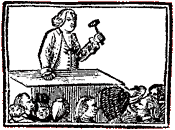“Ebenezer Withington hath declared that he hath sold a Part of the Tea”
They included:
- Ebenezer Withington’s public admission that he had picked up some tea left over from the Boston Tea Party and sold it, but was sorry.
- The town’s long declaration that selling tea like that was very wrong, for the most important political reasons, but Withington hadn’t meant any harm.
First, this one contemporaneous report is not evidence for locals finding Tea Party detritus along the Dorchester shore on the morning after.
Bostonians destroyed that tea on the evening of Thursday, 16 December. The next morning was Friday. Withington was clear he “found said Tea on Saturday, on going round upon the Marshes.” So it may have taken longer than a day for that half-chest to float across Boston harbor.
Not a big deal, but it does hint at how we like to compact details to make better stories. “The next morning” works better than “a day and a half later.”
Second, I wish I knew all the implications of the phrase “some Gentlemen belonging to the Castle,” the description in Withington’s statement of men who asked him about the tea he’d found. During the Tea Party, Castle William (shown above) was the home base of Lt. Col. Alexander Leslie’s 64th Regiment. It also served as a refuge for Boston’s top Customs officials and the tea consignees. And at least a few civilians worked on that island.
Whoever talked to Withington obviously knew that most of his “Neighbors” supported the strict tea boycott. What might they have said about a man salvaging tea for himself? Especially if they were friends of the royal government! No wonder Dorchester leaders expressed concern that people might insinuate “that the whole of the Tea said to have been destroyed was plundered.”
Finally, I was struck by the elevated language of these Dorchester documents. The statement Withington signed begins, “I found said Tea…” There’s nothing about tea before that in the printed proceedings, but the statement may have been written in response to a reference in the warrant for the town meeting, or in a letter from the selectmen. In any event, that “said” was the legal language of depositions.
Likewise, the four town resolutions that follow are in the most formal style. The first even uses “hath” instead of “has,” despite being about a poor man pulling a soggy chest of tea out of a swamp. Dorchester clerk Noah Clap clearly knew he was writing for public consumption and depicted his town at its most upright and proper.
TOMORROW: Inspectors.


